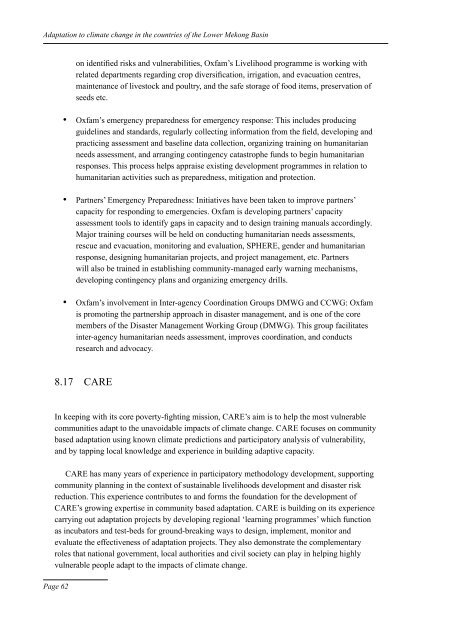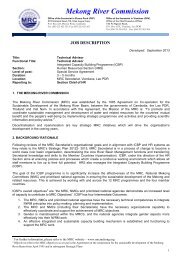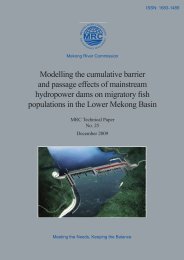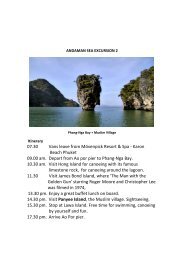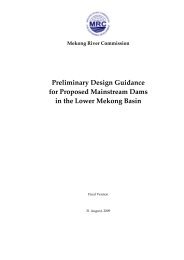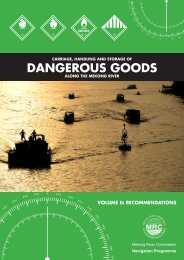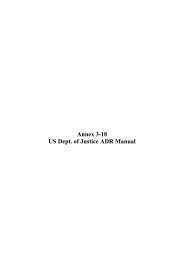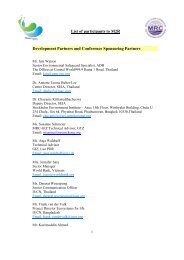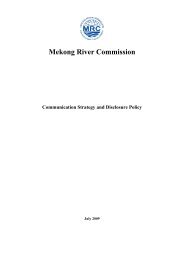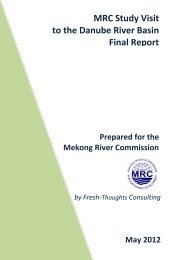Adaptation to climate change in the countries of - Mekong River ...
Adaptation to climate change in the countries of - Mekong River ...
Adaptation to climate change in the countries of - Mekong River ...
You also want an ePaper? Increase the reach of your titles
YUMPU automatically turns print PDFs into web optimized ePapers that Google loves.
<strong>Adaptation</strong> <strong>to</strong> <strong>climate</strong> <strong>change</strong> <strong>in</strong> <strong>the</strong> <strong>countries</strong> <strong>of</strong> <strong>the</strong> Lower <strong>Mekong</strong> Bas<strong>in</strong><br />
Page 62<br />
on identified risks and vulnerabilities, Oxfam’s Livelihood programme is work<strong>in</strong>g with<br />
related departments regard<strong>in</strong>g crop diversification, irrigation, and evacuation centres,<br />
ma<strong>in</strong>tenance <strong>of</strong> lives<strong>to</strong>ck and poultry, and <strong>the</strong> safe s<strong>to</strong>rage <strong>of</strong> food items, preservation <strong>of</strong><br />
seeds etc.<br />
• Oxfam’s emergency preparedness for emergency response: This <strong>in</strong>cludes produc<strong>in</strong>g<br />
guidel<strong>in</strong>es and standards, regularly collect<strong>in</strong>g <strong>in</strong>formation from <strong>the</strong> field, develop<strong>in</strong>g and<br />
practic<strong>in</strong>g assessment and basel<strong>in</strong>e data collection, organiz<strong>in</strong>g tra<strong>in</strong><strong>in</strong>g on humanitarian<br />
needs assessment, and arrang<strong>in</strong>g cont<strong>in</strong>gency catastrophe funds <strong>to</strong> beg<strong>in</strong> humanitarian<br />
responses. This process helps appraise exist<strong>in</strong>g development programmes <strong>in</strong> relation <strong>to</strong><br />
humanitarian activities such as preparedness, mitigation and protection.<br />
• Partners’ Emergency Preparedness: Initiatives have been taken <strong>to</strong> improve partners’<br />
capacity for respond<strong>in</strong>g <strong>to</strong> emergencies. Oxfam is develop<strong>in</strong>g partners’ capacity<br />
assessment <strong>to</strong>ols <strong>to</strong> identify gaps <strong>in</strong> capacity and <strong>to</strong> design tra<strong>in</strong><strong>in</strong>g manuals accord<strong>in</strong>gly.<br />
Major tra<strong>in</strong><strong>in</strong>g courses will be held on conduct<strong>in</strong>g humanitarian needs assessments,<br />
rescue and evacuation, moni<strong>to</strong>r<strong>in</strong>g and evaluation, SPHERE, gender and humanitarian<br />
response, design<strong>in</strong>g humanitarian projects, and project management, etc. Partners<br />
will also be tra<strong>in</strong>ed <strong>in</strong> establish<strong>in</strong>g community-managed early warn<strong>in</strong>g mechanisms,<br />
develop<strong>in</strong>g cont<strong>in</strong>gency plans and organiz<strong>in</strong>g emergency drills.<br />
• Oxfam’s <strong>in</strong>volvement <strong>in</strong> Inter-agency Coord<strong>in</strong>ation Groups DMWG and CCWG: Oxfam<br />
is promot<strong>in</strong>g <strong>the</strong> partnership approach <strong>in</strong> disaster management, and is one <strong>of</strong> <strong>the</strong> core<br />
members <strong>of</strong> <strong>the</strong> Disaster Management Work<strong>in</strong>g Group (DMWG). This group facilitates<br />
<strong>in</strong>ter-agency humanitarian needs assessment, improves coord<strong>in</strong>ation, and conducts<br />
research and advocacy.<br />
8.17 CARE<br />
In keep<strong>in</strong>g with its core poverty-fight<strong>in</strong>g mission, CARE’s aim is <strong>to</strong> help <strong>the</strong> most vulnerable<br />
communities adapt <strong>to</strong> <strong>the</strong> unavoidable impacts <strong>of</strong> <strong>climate</strong> <strong>change</strong>. CARE focuses on community<br />
based adaptation us<strong>in</strong>g known <strong>climate</strong> predictions and participa<strong>to</strong>ry analysis <strong>of</strong> vulnerability,<br />
and by tapp<strong>in</strong>g local knowledge and experience <strong>in</strong> build<strong>in</strong>g adaptive capacity.<br />
CARE has many years <strong>of</strong> experience <strong>in</strong> participa<strong>to</strong>ry methodology development, support<strong>in</strong>g<br />
community plann<strong>in</strong>g <strong>in</strong> <strong>the</strong> context <strong>of</strong> susta<strong>in</strong>able livelihoods development and disaster risk<br />
reduction. This experience contributes <strong>to</strong> and forms <strong>the</strong> foundation for <strong>the</strong> development <strong>of</strong><br />
CARE’s grow<strong>in</strong>g expertise <strong>in</strong> community based adaptation. CARE is build<strong>in</strong>g on its experience<br />
carry<strong>in</strong>g out adaptation projects by develop<strong>in</strong>g regional ‘learn<strong>in</strong>g programmes’ which function<br />
as <strong>in</strong>cuba<strong>to</strong>rs and test-beds for ground-break<strong>in</strong>g ways <strong>to</strong> design, implement, moni<strong>to</strong>r and<br />
evaluate <strong>the</strong> effectiveness <strong>of</strong> adaptation projects. They also demonstrate <strong>the</strong> complementary<br />
roles that national government, local authorities and civil society can play <strong>in</strong> help<strong>in</strong>g highly<br />
vulnerable people adapt <strong>to</strong> <strong>the</strong> impacts <strong>of</strong> <strong>climate</strong> <strong>change</strong>.


